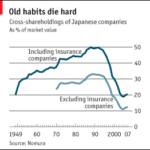
1.Purpose The Japan Revitalization Strategy as revised in 2015 (Cabinet Decision, June 30, 2015) states that “we need to work actively to prevail and to promote the adoption of Japan’s Stewardship Code, established and released in February 2014 (“JSC”), and Japan’s Corporate Governance Code, which entered into force in June 2015 (“JCGC”), as ‘the two wheels of a cart’ such that the sustainable growth of companies will be promoted by both sides of investors and companies.
Further improvements of corporate governance, e.g., making governance function not only formally, but also effectively, continue to be a major agenda, and we need to link such efforts to the establishment of a virtuous economic cycle.
In this respect, for the purpose of following up with the prevalence and adoption of JSC and JCGC as well as further improving corporate governance of all listed companies, we hereby announce the establishment of the “Council of Experts Concerning the Follow-up of Japan’s Stewardship Code and Japan’s Corporate Governance Code” (the “Council”).
2. Organization (1)The Council will be composed of outside experts; including members from corporate managers, local and foreign investors, and academics (the member list will be released later).

 Japan’s return on equity (ROE) revolution is now underway and is evolving into a revolution in corporate productivity and return on investment underpinned by Japan’s Corporate Governance Code, which established fundamental principles for governance at listed companies in Japan, and Japan’s Stewardship Code, which established principles for institutional investors.
Japan’s return on equity (ROE) revolution is now underway and is evolving into a revolution in corporate productivity and return on investment underpinned by Japan’s Corporate Governance Code, which established fundamental principles for governance at listed companies in Japan, and Japan’s Stewardship Code, which established principles for institutional investors.

.png) In a filing with the Tokyo Stock Exchange, MUFG said it tested 3.8 trillion yen ($30.6 billion) worth of shares, about 70 percent of its cross-shareholdings, against the new criteria. About 20 percent of the shareholdings tested do not meet the criteria and the bank will consider selling them unless their returns improve, it said.
In a filing with the Tokyo Stock Exchange, MUFG said it tested 3.8 trillion yen ($30.6 billion) worth of shares, about 70 percent of its cross-shareholdings, against the new criteria. About 20 percent of the shareholdings tested do not meet the criteria and the bank will consider selling them unless their returns improve, it said. Excerpt: “The vast firm, which had sales of 600 billion yen last fiscal year, hired outside directors and adopted a 16-member board a decade ago, among other changes, to “enhance management efficiency and improve transparency”.
Excerpt: “The vast firm, which had sales of 600 billion yen last fiscal year, hired outside directors and adopted a 16-member board a decade ago, among other changes, to “enhance management efficiency and improve transparency”. Excerpt: “The vast firm, which had sales of 600 billion yen last fiscal year, hired outside directors and adopted a 16-member board a decade ago, among other changes, to “enhance management efficiency and improve transparency”.But the scathing report—commissioned by the company after financial regulators questioned Toshiba’s books earli
Excerpt: “The vast firm, which had sales of 600 billion yen last fiscal year, hired outside directors and adopted a 16-member board a decade ago, among other changes, to “enhance management efficiency and improve transparency”.But the scathing report—commissioned by the company after financial regulators questioned Toshiba’s books earli